Student Characteristics and ICT Usage as Predictors of Computational Thinking: An Explainable AI Approach
Abstract
1. Introduction
2. Literature Review
2.1. Computational Thinking
2.2. Research Progress on the Factors That Influence CT
2.3. Applications of Educational Data Mining in CT Research
3. Methods
3.1. Data
- The problem conceptualization modules assessed students’ ability to understand and plan computational solutions using tools such as flowcharts, decision trees, and visual data representations. Students were asked to interpret scenarios and model systems in visual formats.
- The solution operationalization modules focused on students’ capacity to implement and execute computational solutions in a block-based programming environment. Students wrote and tested the code using an interactive visual interface that displayed execution outcomes.
3.2. Statistical and Machine Learning Techniques
3.2.1. LightGBM
3.2.2. Random Forest
3.2.3. SHapley Additive exPlanations
3.3. Data Analysis
3.3.1. Data Preprocessing
3.3.2. Feature Selection and Model Optimization
3.3.3. Model Interpretation
- S is a subset of the full feature set F, excluding feature Xi;
- f(S∪{i}) is the model prediction when feature Xi is included;
- f(S) is the model prediction without feature Xi;
- The formula calculates the average marginal contribution of feature Xi across all possible feature combinations.
4. Results
4.1. RQ1: Which Background Characteristics and ICT Usage Most Strongly Predict Students’ Computational Thinking?
4.2. RQ2: How Do the Most Influential Features Affect Students’ Computational Thinking?
5. Discussion
6. Conclusions
7. Limitations
Author Contributions
Funding
Institutional Review Board Statement
Informed Consent Statement
Data Availability Statement
Conflicts of Interest
Abbreviations
| CT | Computational thinking |
| ICT | Information and Communication Technology |
| XAI | Explainable Artificial Intelligence |
Appendix A
Final Set of the Top 10 Predictive Features
| Variable ID | Item Content | Source |
| IS3G22G | At school, how often do you use ICT during lessons in the following subjects or subject areas? [Information technology, computer studies or similar] | ICT Questionnaire |
| IS3G03 | What is the highest level of education you expect to complete? | Background Questionnaire |
| IS3G14 | About how many books are there in your home? | Background Questionnaire |
| IS3G22H | At school, how often do you use ICT during lessons in the following subjects or subject areas? Practical or vocational [Add any appropriate national examples] | ICT Questionnaire |
| IS3G21B | Outside of school, how often do you do the following activities not related to your schoolwork at the same time as doing your schoolwork? Use social media (e.g., [Instagram, TikTok and Snapchat]) to post or view content | ICT Questionnaire |
| IS3G21C | Outside of school, how often do you do the following activities not related to your schoolwork at the same time as doing your schoolwork? Check social media for new posts or responses to my posts | ICT Questionnaire |
| IS3G18E | How often do you use ICT in these places? (On non-school days) Outside of school for schoolwork | ICT Questionnaire |
| IS3G18A | How often do you use ICT in these places? (On school days) At school for schoolwork | ICT Questionnaire |
| IS3G18C | How often do you use ICT in these places? (On school days) Outside of school for schoolwork | ICT Questionnaire |
| IS3G18B | How often do you use ICT in these places? (On school days) At school for other purposes | ICT Questionnaire |
References
- Abdrakhmanov, Rustam, Ainur Zhaxanova, Malika Karatayeva, Gulzhan Zholaushievna Niyazova, Kamalbek Berkimbayev, and Assyl Tuimebayev. 2024. Development of a Framework for Predicting Students’ Academic Performance in STEM Education using Machine Learning Methods. International Journal of Advanced Computer Science and Applications 15: 38–46. [Google Scholar] [CrossRef]
- Agbo, Friday Joseph, Sunday Adewale Olaleye, Matt Bower, and Solomon Sunday Oyelere. 2023. Examining the relationships between students’ perceptions of technology, pedagogy, and cognition: The case of immersive virtual reality mini games to foster computational thinking in higher education. Smart Learning Environments 10: 16. [Google Scholar] [CrossRef] [PubMed]
- Alvarez-Garcia, Miguel, Mar Arenas-Parra, and Raquel Ibar-Alonso. 2024. Uncovering student profiles. An explainable cluster analysis approach to PISA 2022. Computers & Education 223: 105166. [Google Scholar] [CrossRef]
- Aulia, Mirza, Siti Fatimah, Jarnawi Afgani Dahlan, and Abdul Wahab A. 2025. Exploring research on computational thinking in mathematics: Trends, challenges, and impact on modern learning. Jurnal Pendidikan MIPA 26: 1196–218. [Google Scholar] [CrossRef]
- Batool, Saba, Junaid Rashid, Muhammad Wasif Nisar, Jungeun Kim, Hyuk-Yoon Kwon, and Amir Hussain. 2023. Educational data mining to predict students’ academic performance: A survey study. Education and Information Technologies 28: 905–71. [Google Scholar] [CrossRef]
- Bourdieu, Pierre, Patrick Champagne, Franck Poupeau, Marie-Christine Rivière, and Pierre Bourdieu. 2011. Forms of Capital: Lectures at the Collège de France (1983–1984). Edited by Jean-François Duval. Translated by Peter Collier. Cambridge: Polity. [Google Scholar]
- Breiman, Leo. 2001. Random Forests. Machine Learning 45: 5–32. [Google Scholar] [CrossRef]
- Chango, Wilson, Rebeca Cerezo, and Cristóbal Romero. 2021. Multi-source and multimodal data fusion for predicting academic performance in blended learning university courses. Computers & Electrical Engineering 89: 106908. [Google Scholar] [CrossRef]
- Chen, Lei-Da, Toru Sakaguchi, and Mark N. Frolick. 2000. Data Mining Methods, Applications, and Tools. Information Systems Management 17: 65–70. [Google Scholar] [CrossRef]
- Cortoni, Ida. 2025. Analysis of digital capital for social inclusion in educational context. British Educational Research Journal 51: 533–53. [Google Scholar] [CrossRef]
- Cukurova, Mutlu. 2025. The interplay of learning, analytics and artificial intelligence in education: A vision for hybrid intelligence. British Journal of Educational Technology 56: 469–88. [Google Scholar] [CrossRef]
- De Medio, Carlo, Carla Limongelli, Filippo Sciarrone, and Marco Temperini. 2020. MoodleREC: A recommendation system for creating courses using the moodle e-learning platform. Computers in Human Behavior 104: 106168. [Google Scholar] [CrossRef]
- Durak, Hatice Yildiz, and Mustafa Saritepeci. 2018. Analysis of the relation between computational thinking skills and various variables with the structural equation model. Computers & Education 116: 191–202. [Google Scholar] [CrossRef]
- Elahi, Mehdi, Francesco Ricci, and Neil Rubens. 2016. A survey of active learning in collaborative filtering recommender systems. Computer Science Review 20: 29–50. [Google Scholar] [CrossRef]
- Ezeamuzie, Ndudi O. 2024. Influence of school characteristics on computational thinking: A supervised machine learning approach. Education and Information Technologies 29: 20077–101. [Google Scholar] [CrossRef]
- Ezeamuzie, Ndudi O., Jessica S. C. Leung, Dennis C. L. Fung, and Mercy N. Ezeamuzie. 2024. Educational policy as predictor of computational thinking: A supervised machine learning approach. Journal of Computer Assisted Learning 40: 2872–85. [Google Scholar] [CrossRef]
- Ferguson, Rebecca, Dorothy Faulkner, Denise Whitelock, and Kieron Sheehy. 2015. Pre-teens’ informal learning with ICT and Web 2.0. Technology, Pedagogy and Education 24: 247–65. [Google Scholar] [CrossRef]
- Flavell, John H. 1979. Metacognition and cognitive monitoring: A new area of cognitive–developmental inquiry. American Psychologist 34: 906–11. [Google Scholar] [CrossRef]
- Fraillon, Julian, and Mojca Rožman, eds. 2025. IEA International Computer and Information Literacy Study 2023: Assessment Framework. Cham: Springer Nature Switzerland. [Google Scholar] [CrossRef]
- Fraillon, Julian, John Ainley, Wolfram Schulz, Daniel Duckworth, and Tim Friedman. 2019. IEA International Computer and Information Literacy Study 2018 Assessment Framework. Cham: Springer International Publishing. [Google Scholar] [CrossRef]
- Fraillon, Julian, John Ainley, Wolfram Schulz, Tim Friedman, and Daniel Duckworth. 2020. Preparing for Life in a Digital World: IEA International Computer and Information Literacy Study 2018 International Report. Cham: Springer International Publishing. [Google Scholar] [CrossRef]
- García, Enrique, Cristóbal Romero, Sebastián Ventura, and Carlos de Castro. 2009. An architecture for making recommendations to courseware authors using association rule mining and collaborative filtering. User Modeling and User-Adapted Interaction 19: 99–132. [Google Scholar] [CrossRef]
- Grover, Shuchi, and Roy Pea. 2013. Computational Thinking in K–12: A Review of the State of the Field. Educational Researcher 42: 38–43. [Google Scholar] [CrossRef]
- Grover, Shuchi, and Roy Pea. 2018. Computational Thinking: A Competency Whose Time Has Come, 1st ed. London: Zed Books. [Google Scholar] [CrossRef]
- Grover, Shuchi, and Satabdi Basu. 2017. Measuring Student Learning in Introductory Block-Based Programming: Examining Misconceptions of Loops, Variables, and Boolean Logic. Paper presented at 2017 ACM SIGCSE Technical Symposium on Computer Science Education, Seattle, WA, USA, March 8–11; pp. 267–72. [Google Scholar] [CrossRef]
- Herro, Danielle, Cassie Quigley, Holly Plank, and Oluwadara Abimbade. 2021. Understanding students’ social interactions during making activities designed to promote computational thinking. The Journal of Educational Research 114: 183–95. [Google Scholar] [CrossRef]
- Holmberg, Nils. 2016. Effects of Online Advertising on Children’s Visual Attention and Task Performance During Free and Goal-Directed Internet Use: A Media Psychology Approach to Children’s Website Interaction and Advert Distraction. Ph.D. thesis, University of Gothenburg, Gothenburg, Sweden. [Google Scholar] [CrossRef]
- Hsu, Ting-Chia, Shao-Chen Chang, and Yu-Ting Hung. 2018. How to learn and how to teach computational thinking: Suggestions based on a review of the literature. Computers & Education 126: 296–310. [Google Scholar] [CrossRef]
- Hu, Linlin. 2024. Exploring gender differences in computational thinking among K-12 students: A meta-analysis investigating influential factors. Journal of Educational Computing Research 62: 1138–64. [Google Scholar] [CrossRef]
- ICILS. 2023. ICILS 2023 International Database: International Computer and Information Literacy Study_Edition_2 (Version 2) [Dataset]. Amsterdam: IEA—International Association for the Evaluation of Educational Achievement. [Google Scholar] [CrossRef]
- Jiang, Shiyan, Yingxiao Qian, Hengtao Tang, Rabia Yalcinkaya, Carolyn P. Rosé, Jie Chao, and William Finzer. 2023. Examining computational thinking processes in modeling unstructured data. Education and Information Technologies 28: 4309–33. [Google Scholar] [CrossRef]
- Junco, Reynol. 2012. The relationship between frequency of Facebook use, participation in Facebook activities, and student engagement. Computers & Education 58: 162–71. [Google Scholar] [CrossRef]
- Ke, Guolin, Qi Meng, Thomas Finley, Taifeng Wang, Wei Chen, Weidong Ma, Qiwei Ye, and Tie-Yan Liu. 2017. LightGBM: A highly efficient gradient boosting decision tree. In Advances in Neural Information Processing Systems (Vol. 30). Edited by Isabelle Guyon, Ulrike von Luxburg, Samy Bengio, Hanna M. Wallach, Rob Fergus, S. V. N. Vishwanathan and Roman Garnett. Red Hook: Curran Associates, Inc. Available online: https://proceedings.neurips.cc/paper_files/paper/2017/file/6449f44a102fde848669bdd9eb6b76fa-Paper.pdf (accessed on 15 May 2025).
- Kirschner, Paul A., and Pedro De Bruyckere. 2017. The myths of the digital native and the multitasker. Teaching and Teacher Education 67: 135–42. [Google Scholar] [CrossRef]
- Lai, Rina P. Y. 2022. Teachers’ Ontological Perspectives of Computational Thinking and Assessment: A Text Mining Approach. Journal of Educational Computing Research 60: 661–95. [Google Scholar] [CrossRef]
- Lee, Jaeho, and Junhyung Jang. 2019. An Analysis of Research Trends in Computational Thinking using Text Mining Technique. Journal of The Korean Association of Information Education 23: 543–50. [Google Scholar] [CrossRef]
- Li, Wei, Cheng-Ye Liu, and Judy C. R. Tseng. 2023. Effects of the interaction between metacognition teaching and students’ learning achievement on students’ computational thinking, critical thinking, and metacognition in collaborative programming learning. Education and Information Technologies 28: 12919–43. [Google Scholar] [CrossRef]
- Lim, Cher Ping, and Ching Sing Chai. 2008. Rethinking classroom-oriented instructional development models to mediate instructional planning in technology-enhanced learning environments. Teaching and Teacher Education 24: 2002–13. [Google Scholar] [CrossRef]
- Liu, Zhichun, Zarina Gearty, Eleanor Richard, Chandra Hawley Orrill, Shakhnoza Kayumova, and Ramprasad Balasubramanian. 2024. Bringing computational thinking into classrooms: A systematic review on supporting teachers in integrating computational thinking into K-12 classrooms. International Journal of STEM Education 11: 51. [Google Scholar] [CrossRef]
- Livingstone, Sonia, and Ellen Helsper. 2007. Gradations in digital inclusion: Children, young people and the digital divide. New Media & Society 9: 671–96. [Google Scholar] [CrossRef]
- Lundberg, Scott M., and Su-In Lee. 2017. A Unified Approach to Interpreting Model Predictions. Paper presented at 31st Conference on Neural Information Processing Systems, Long Beach, CA, USA, December 4–9. [Google Scholar]
- Ma, Jingsi, Yi Zhang, Zhifang Zhu, Sunan Zhao, and Qiyun Wang. 2023. Game-based learning for students’ computational thinking: A meta-analysis. Journal of Educational Computing Research 61: 1430–63. [Google Scholar] [CrossRef]
- Mills, Kathy A., Jen Cope, Laura Scholes, and Luke Rowe. 2024. Coding and computational thinking across the curriculum: A review of educational outcomes. Review of Educational Research 95: 581–18. [Google Scholar] [CrossRef]
- Montag, Christian, and Sebastian Markett. 2023. Social media use and everyday cognitive failure: Investigating the fear of missing out and social networks use disorder relationship. BMC Psychiatry 23: 872. [Google Scholar] [CrossRef] [PubMed]
- Nouri, Jalal, Lechen Zhang, Linda Mannila, and Eva Norén. 2020. Development of computational thinking, digital competence and 21st century skills when learning programming in K-9. Education Inquiry 11: 1–17. [Google Scholar] [CrossRef]
- Özgür, Hasan. 2020. Relationships between Computational Thinking Skills, Ways of Thinking and Demographic Variables: A Structural Equation Modeling. International Journal of Research in Education and Science 6: 299. [Google Scholar] [CrossRef]
- Palop, Belén, Irene Díaz, Luis J. Rodríguez-Muñiz, and Juan José Santaengracia. 2025. Redefining computational thinking: A holistic framework and its implications for K-12 education. Education and Information Technologies 30: 13385–410. [Google Scholar] [CrossRef]
- Rafiq, Arif Ainur, Mochamad Bruri Triyono, Istanto Wahyu Djatmiko, Ratna Wardani, and Thomas Köhler. 2023. Mapping the evolution of computational thinking in education: A bibliometrics analysis of scopus database from 1987 to 2023. Informatics in Education 22: 691–724. [Google Scholar] [CrossRef]
- Rao, Toluchuri Shalini Shanker, and Kaushal Kumar Bhagat. 2024. Computational thinking for the digital age: A systematic review of tools, pedagogical strategies, and assessment practices. Educational Technology Research and Development 72: 1893–924. [Google Scholar] [CrossRef]
- Román-González, Marcos, Juan-Carlos Pérez-González, and Carmen Jiménez-Fernández. 2017. Which cognitive abilities underlie computational thinking? Criterion validity of the Computational Thinking Test. Computers in Human Behavior 72: 678–91. [Google Scholar] [CrossRef]
- Romero, Cristobal, and Sebastian Ventura. 2020. Educational data mining and learning analytics: An updated survey. WIREs Data Mining and Knowledge Discovery 10: e1355. [Google Scholar] [CrossRef]
- Sarra, Annalina, Lara Fontanella, and Simone Di Zio. 2019. Identifying Students at Risk of Academic Failure Within the Educational Data Mining Framework. Social Indicators Research 146: 41–60. [Google Scholar] [CrossRef]
- Schwartz, Lou, Valérie Maquil, Laurence Johannsen, Christian Moll, and Johannes Hermen. 2024. Teaching computational thinking with a tangible development platform: An exploratory field study at school with kniwwelino. Education and Information Technologies 29: 4935–67. [Google Scholar] [CrossRef]
- Selwyn, Neil. 2021. Education and Technology: Key Issues and Debates. London: Bloomsbury Academic. [Google Scholar]
- Shute, Valerie J., Chen Sun, and Jodi Asbell-Clarke. 2017. Demystifying computational thinking. Educational Research Review 22: 142–58. [Google Scholar] [CrossRef]
- Sirakaya, Didem Alsancak. 2020. Investigation of Computational Thinking in the Context of ICT and Mobile Technologies. International Journal of Computer Science Education in Schools 3: 50–59. [Google Scholar] [CrossRef]
- Siu-cheung, Diana, and Gautam. 2019. International Conference on Computational Thinking Education 2019. Hong Kong: The Education University of Hong Kong. [Google Scholar]
- Stewart, William H., Youngkyun Baek, Gina Kwid, and Kellie Taylor. 2021. Exploring factors that influence computational thinking skills in elementary students’ collaborative robotics. Journal of Educational Computing Research 59: 1208–39. [Google Scholar] [CrossRef]
- Sudadi, Sudadi, Enos Lolang, Joko Ariawan, Iwan Henri Kusnadi, and Misbahul Munir. 2023. The effectiveness analysis of computational thinking patterns and levels of students’ meta-cognitive awareness in solving learning problems. Journal on Education 6: 2166–71. [Google Scholar] [CrossRef]
- Sun, Lihui, Junjie Liu, and Yunshan Liu. 2024. Comparative experiment of the effects of unplugged and plugged-in programming on computational thinking in primary school students: A perspective of multiple influential factors. Thinking Skills and Creativity 52: 101542. [Google Scholar] [CrossRef]
- Tamim, Rana M., Robert M. Bernard, Eugene Borokhovski, Philip C. Abrami, and Richard F. Schmid. 2011. What forty years of research says about the impact of technology on learning: A second-order meta-analysis and validation study. Review of Educational Research 81: 4–28. [Google Scholar] [CrossRef]
- Tan, Cheng Yong, and Khe Foon Hew. 2019. The impact of digital divides on student mathematics achievement in confucian heritage cultures: A critical examination using PISA 2012 data. International Journal of Science and Mathematics Education 17: 1213–32. [Google Scholar] [CrossRef]
- Tan, Lihua, Fu Chen, and Bing Wei. 2024. Examining key capitals contributing to students’ science-related career expectations and their relationship patterns: A machine learning approach. Journal of Research in Science Teaching 61: 1975–2010. [Google Scholar] [CrossRef]
- Tariq, Rasikh, Bertha Maria Aponte Babines, Jesus Ramirez, Inés Alvarez-Icaza, and Fawad Naseer. 2025. Computational thinking in STEM education: Current state-of-the-art and future research directions. Frontiers in Computer Science 6: 1480404. [Google Scholar] [CrossRef]
- Tatineni, Sumanth. 2020. Recommendation Systems for Personalized Learning: A Data-Driven Approach in Education. Journal of Computer Engineering and Technology 4: 18–31. [Google Scholar]
- Tiukhova, Elena, Pavani Vemuri, Nidia López Flores, Anna Sigridur Islind, María Óskarsdóttir, Stephan Poelmans, Bart Baesens, and Monique Snoeck. 2024. Explainable Learning Analytics: Assessing the stability of student success prediction models by means of explainable AI. Decision Support Systems 182: 114229. [Google Scholar] [CrossRef]
- Voogt, Joke, Petra Fisser, Jon Good, Punya Mishra, and Aman Yadav. 2015. Computational thinking in compulsory education: Towards an agenda for research and practice. Education and Information Technologies 20: 715–28. [Google Scholar] [CrossRef]
- Vrieler, Tina. 2017. Digital capital: A platform for developing computational thinking. Paper presented at 17th Koli Calling International Conference on Computing Education Research, Koli, Finland, November 16–19; pp. 205–06. [Google Scholar] [CrossRef]
- Wang, Cixiao, and Jianjun Xiao. 2025. A role recognition model based on students’ social-behavioural–cognitive-emotional features during collaborative learning. Interactive Learning Environments 33: 3203–22. [Google Scholar] [CrossRef]
- Wang, Feng, and Michael J. Hannafin. 2005. Design-based research and technology-enhanced learning environments. Educational Technology Research and Development 53: 5–23. [Google Scholar] [CrossRef]
- Weintrop, David, Elham Beheshti, Michael Horn, Kai Orton, Kemi Jona, Laura Trouille, and Uri Wilensky. 2016. Defining Computational Thinking for Mathematics and Science Classrooms. Journal of Science Education and Technology 25: 127–47. [Google Scholar] [CrossRef]
- Wilmer, Henry H., Lauren E. Sherman, and Jason M. Chein. 2017. Smartphones and cognition: A review of research exploring the links between mobile technology habits and cognitive functioning. Frontiers in Psychology 8: 605. [Google Scholar] [CrossRef]
- Wing, Jeannette M. 2006. Computational thinking. Communications of the ACM 49: 33–35. [Google Scholar] [CrossRef]
- Yadav, Aman, Hai Hong, and Chris Stephenson. 2016. Computational Thinking for All: Pedagogical Approaches to Embedding 21st Century Problem Solving in K-12 Classrooms. TechTrends 60: 565–68. [Google Scholar] [CrossRef]
- Zawacki-Richter, Olaf, Victoria I. Marín, Melissa Bond, and Franziska Gouverneur. 2019. Systematic review of research on artificial intelligence applications in higher education—Where are the educators? International Journal of Educational Technology in Higher Education 16: 39. [Google Scholar] [CrossRef]
- Zhang, Yuhui, Damin Xu, Jianwei Gao, Ruiguo Wang, Kun Yan, Hong Liang, Juan Xu, Youlu Zhao, Xizi Zheng, Lingyi Xu, and et al. 2025. Development and validation of a real-time prediction model for acute kidney injury in hospitalized patients. Nature Communications 16: 68. [Google Scholar] [CrossRef]
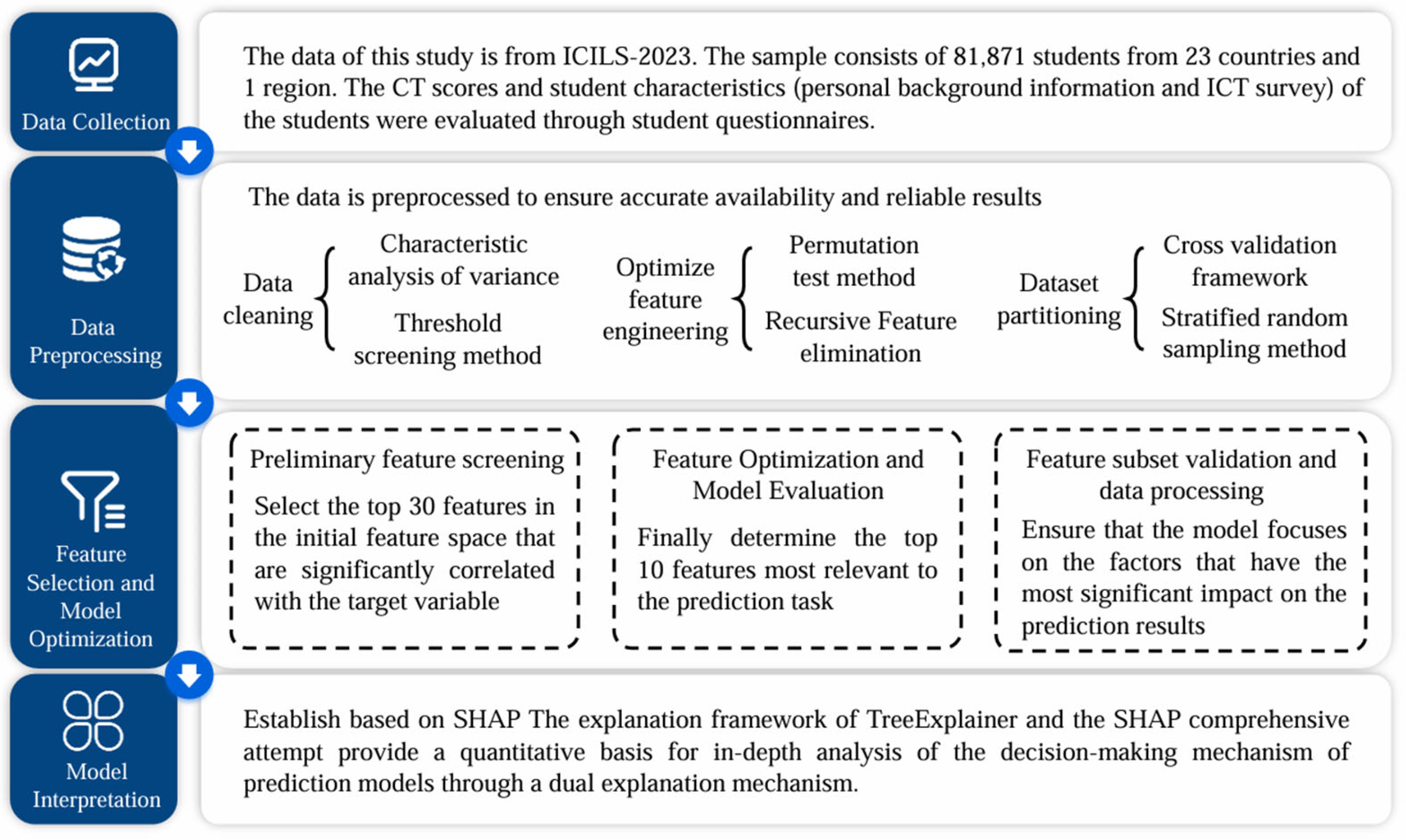
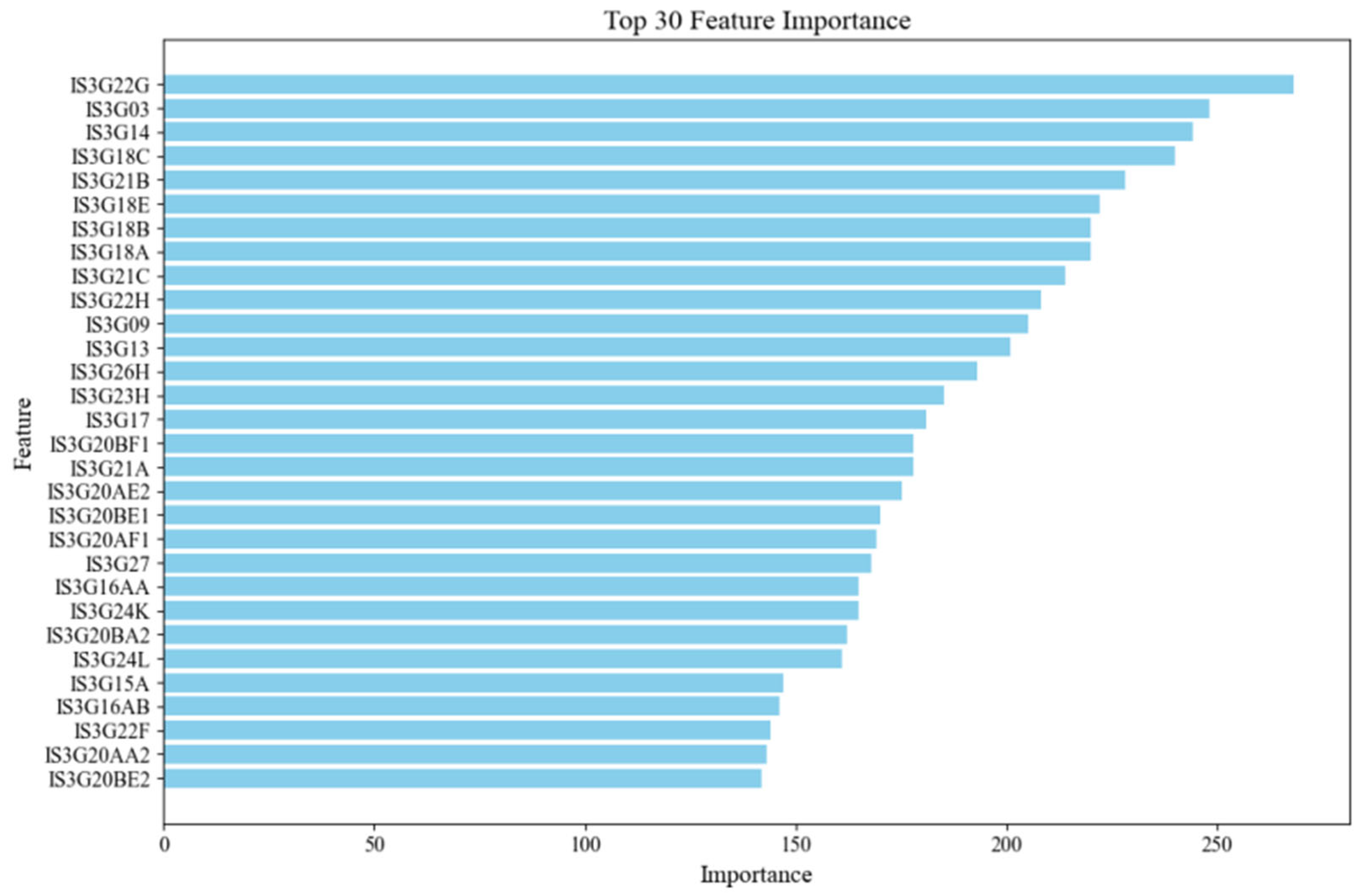

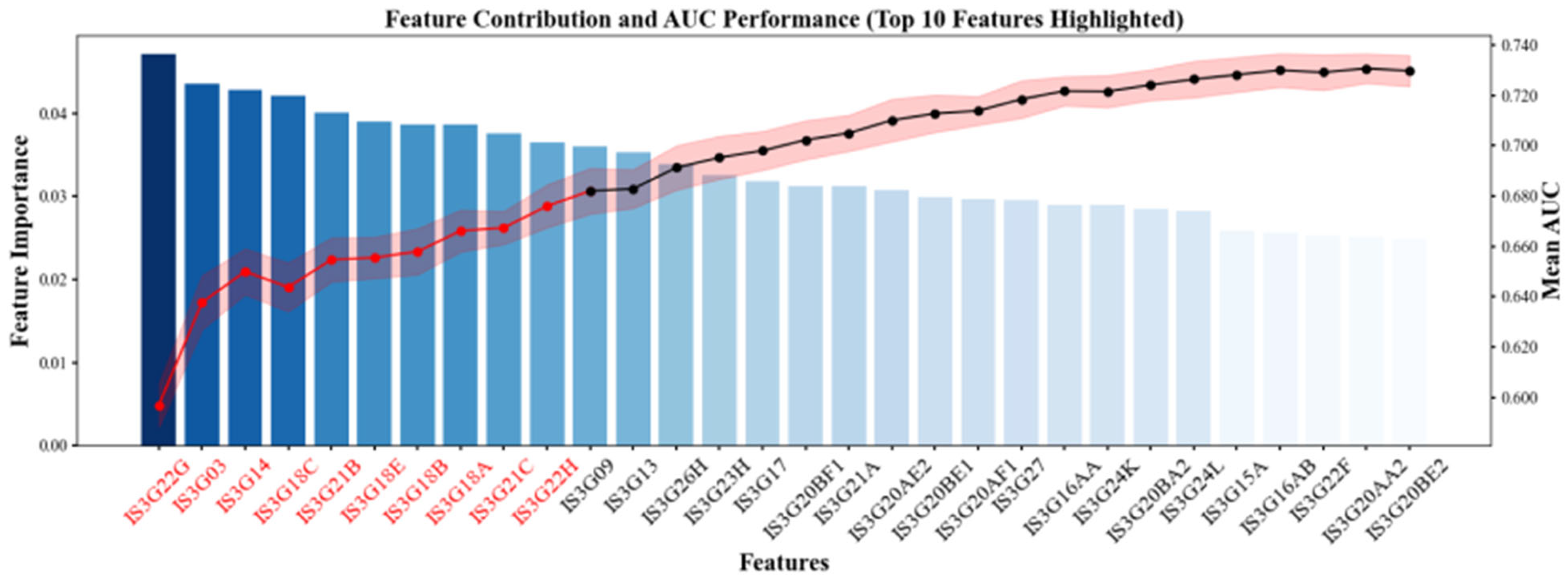
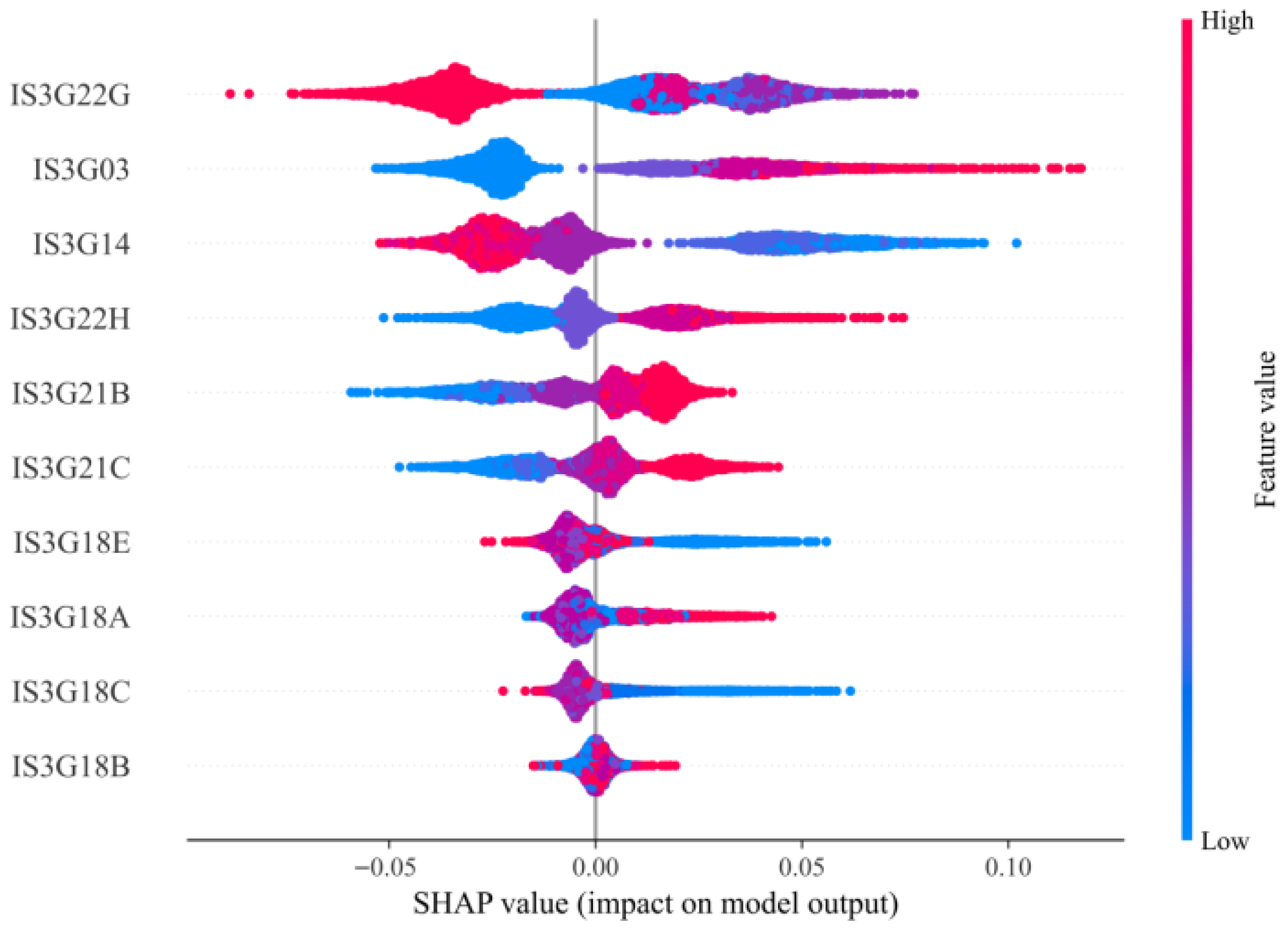
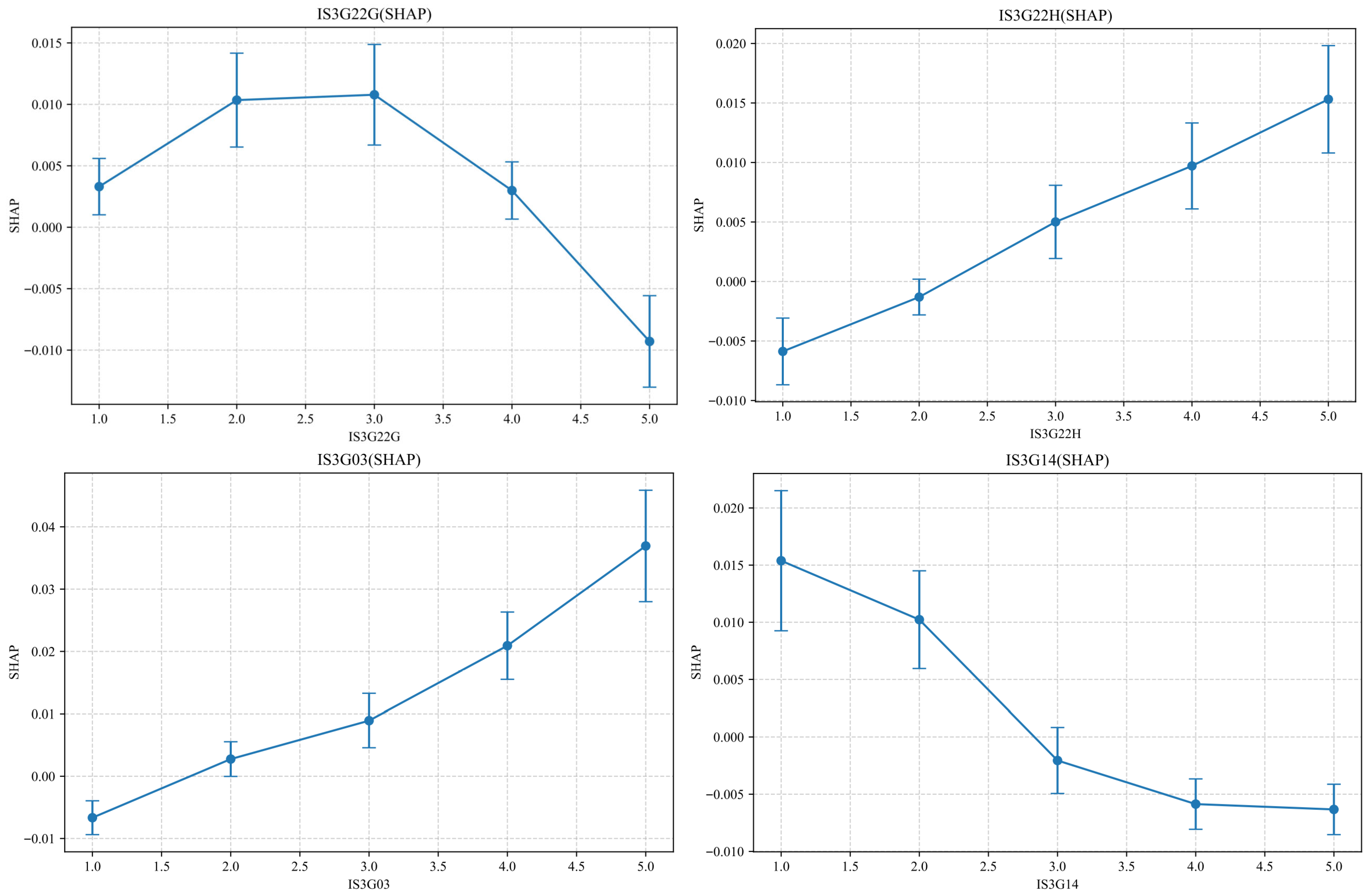
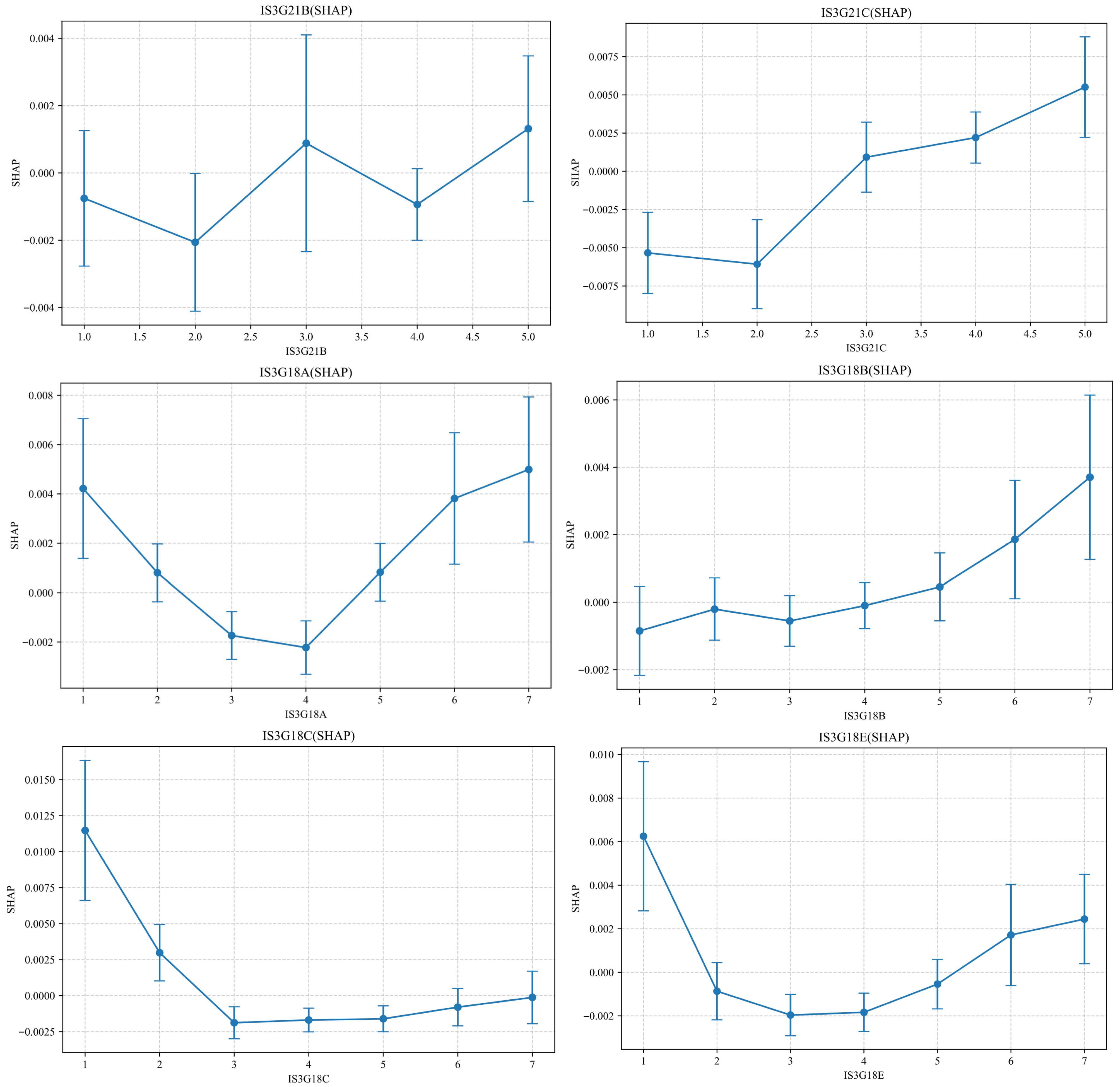
Disclaimer/Publisher’s Note: The statements, opinions and data contained in all publications are solely those of the individual author(s) and contributor(s) and not of MDPI and/or the editor(s). MDPI and/or the editor(s) disclaim responsibility for any injury to people or property resulting from any ideas, methods, instructions or products referred to in the content. |
© 2025 by the authors. Licensee MDPI, Basel, Switzerland. This article is an open access article distributed under the terms and conditions of the Creative Commons Attribution (CC BY) license (https://creativecommons.org/licenses/by/4.0/).
Share and Cite
Guan, T.; Zhang, L.; Ji, X.; He, Y.; Zheng, Y. Student Characteristics and ICT Usage as Predictors of Computational Thinking: An Explainable AI Approach. J. Intell. 2025, 13, 145. https://doi.org/10.3390/jintelligence13110145
Guan T, Zhang L, Ji X, He Y, Zheng Y. Student Characteristics and ICT Usage as Predictors of Computational Thinking: An Explainable AI Approach. Journal of Intelligence. 2025; 13(11):145. https://doi.org/10.3390/jintelligence13110145
Chicago/Turabian StyleGuan, Tongtong, Liqiang Zhang, Xingshu Ji, Yuze He, and Yonghe Zheng. 2025. "Student Characteristics and ICT Usage as Predictors of Computational Thinking: An Explainable AI Approach" Journal of Intelligence 13, no. 11: 145. https://doi.org/10.3390/jintelligence13110145
APA StyleGuan, T., Zhang, L., Ji, X., He, Y., & Zheng, Y. (2025). Student Characteristics and ICT Usage as Predictors of Computational Thinking: An Explainable AI Approach. Journal of Intelligence, 13(11), 145. https://doi.org/10.3390/jintelligence13110145




